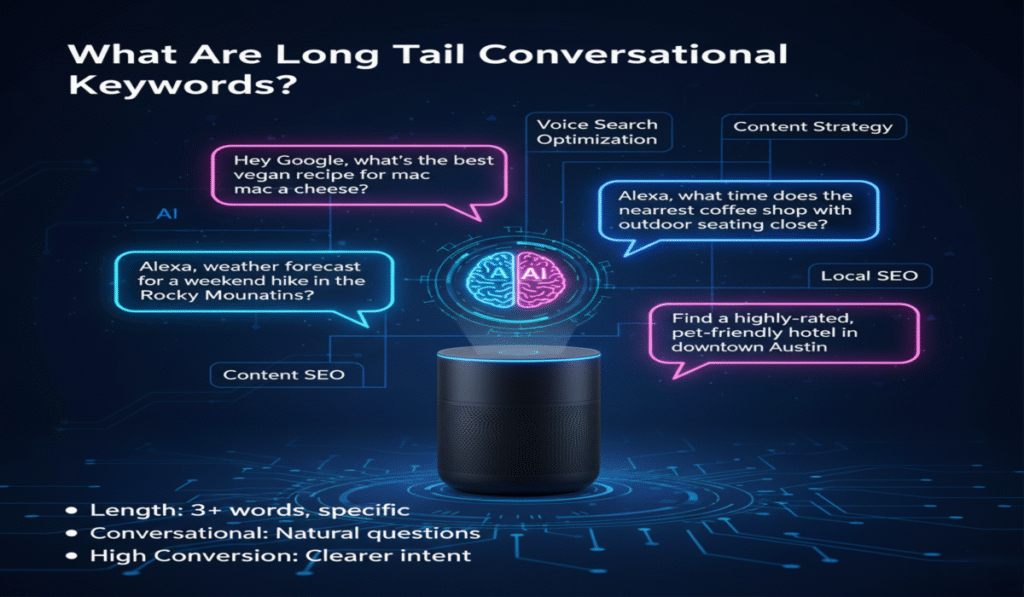Discover how long tail conversational keywords for smart speaker queries can boost your voice search SEO. Learn strategies, examples, and best practices to rank higher in smart speaker results.
Table of Contents
Introduction
In today’s virtual international, voice seek has turn out to be one of the fastest-growing trends. With clever audio system like Amazon Alexa, Google Home, and Apple’s Siri, human beings now pick asking questions in their herbal speakme fashion in preference to typing quick queries. This shift has created a large opportunity for companies and content material creators to optimize their web sites the usage of long tail conversational key phrases for smart speaker queries.

Unlike brief key phrases that people kind in search engines like google and yahoo, voice searches are longer, conversational, and regularly framed as complete questions. For instance:
Text seek: “pleasant dentist Lucknow”
Voice seek: “Hey Google, who’s the fine dentist near me in Lucknow open now?”
In this blog, we can discover the importance of long tail conversational keywords for smart speaker queries, how they can transform SEO, and how you may use them to improve your visibility in voice seek effects.
What Are Long Tail Conversational Keywords?

Long tail key phrases are longer, specific search phrases that mirror how people clearly speak. When we upload the conversational tone that smart speakers demand, they end up long tail conversational keywords for smart speaker queries.
Instead of a customary key-word like “virtual advertising”, people ask smart speakers questions like:
- “What is the best digital marketing agency near me?”
- “How much does digital marketing cost for small businesses?”
These are examples of herbal language queries that smart audio system can easily interpret and solution.
Why Long Tail Conversational Keywords for Smart Speaker Queries Matter
1. Natural Speech Alignment
Smart speakers process queries in a conversational way. Optimizing for these queries means your content aligns with how users actually talk.
2. Higher Conversion Intent
Long tail queries are often specific and action-oriented. For example:
- “Where can I buy organic honey near me?” → High purchase intent.
3. Less Competition
Short keywords are highly competitive, but long tail conversational keywords for smart speaker queries have less competition and better ranking opportunities.
4. Improved Local SEO
Most voice searches are local. Optimizing your content ensures your business gets discovered in nearby searches.
Examples of Long Tail Conversational Keywords for Smart Speaker Queries
- “What is the best Italian restaurant open now near me?”
- “How do I fix a leaking tap without calling a plumber?”
- “Which smartphone has the best camera under 30,000 rupees?”
- “Can you tell me the best yoga classes near Lucknow?”
- “What’s the weather like tomorrow in Delhi?”
Notice how these queries are long, question-based, and conversational.
How to Find Long Tail Conversational Keywords for Smart Speaker Queries
1. Use Question-Based Tools
Tools like AnswerThePublic, AlsoAsked, and SEMrush show you real user questions that can be turned into long tail conversational keywords.
2. Analyze “People Also Ask” Boxes
Google’s People Also Ask section is a goldmine for understanding how people phrase their queries.
3. Check Voice Search Trends
Explore Google Trends to identify how users phrase voice search queries in your industry.
4. Use Your Own Customer FAQs
Look at the questions your customers ask regularly. These can be turned into conversational keywords.
How to Use Long Tail Conversational Keywords for Smart Speaker Queries
1. Create FAQ Pages
Smart speakers often pull answers from FAQ-style content. Use your long tail conversational keywords for smart speaker queries as questions in FAQ format.
2. Write in a Conversational Tone
Avoid robotic or keyword-stuffed writing. Write in a way that mimics human conversation.
3. Use Structured Data (Schema Markup)
Adding schema helps search engines understand your content better and increases chances of being picked up for voice responses.
4. Focus on Featured Snippets
Smart speakers usually read answers from featured snippets. Keep answers short, direct, and clear.
5. Optimize for Local Voice Queries
Include “near me,” city names, and service timings in your conversational keywords.
Content Strategy for Voice Search Optimization
To make the most of long tail conversational keywords for smart speaker queries, your content strategy should focus on:
- Short paragraphs with direct answers
- Lists and bullet points for clarity
- Question-based headings like “How can I…?”
- Natural language flow rather than forced SEO
Benefits of Using Long Tail Conversational Keywords for Smart Speaker Queries
- Boosts Organic Traffic – Attracts customers looking with unique voice queries.
- Higher Engagement – Conversational content feels relatable.
- Better Voice SEO Ranking – Smart audio system love natural Q and A fashion content material.
- Stronger Local Presence – Perfect for nearby agencies aiming to seize nearby customers.
- Future-Proof SEO Strategy – Voice search is only developing; being early offers you an area.
Real-Life Case Study
A local bakery optimized its website with long tail conversational keywords for smart speaker queries like:
- “Which bakery near me sells fresh chocolate cake now?”
- “Where can I order customized birthday cakes near Lucknow?”
Within 2 months, they noticed a 40% increase in calls and walk-ins directly from voice-based searches.
Challenges in Using Long Tail Conversational Keywords for Smart Speaker Queries
- Requires deep studies into purchaser language.
- Needs regular updating with changing voice trends.
- Content period can growth due to the fact solutions must be conversational.
- Difficult to stability among brief, direct solutions and search engine marketing intensity.
Best Practices for Long Tail Conversational Keywords for Smart Speaker Queries
- Write for humans first, SEO second.
- Use clear, natural sentences.
- Target question-based searches.
- Add schema markup for FAQs.
- Focus on local intent keywords like “near me.”
The Future of Voice Search

Voice search is predicted to dominate how customers have interaction with virtual gadgets. With clever audio system becoming part of everyday lifestyles, corporations that master long tail conversational keywords for smart speaker queries will live in advance in the opposition.
Conclusion
Optimizing for long tail conversational keywords for smart speaker queries is no longer optionally available—it’s a necessity. These queries replicate how human beings really speak, and smart audio system are designed to reply to natural language.
By growing FAQ pages, writing conversationally, adding schema, and focusing on nearby searches, you may increase your chances of ranking in voice search effects.
If you need to future-proof your search engine optimization and entice extra users, now’s the time to start using long tail conversational keywords for smart speaker queries on your content material approach.
FAQs
Q1. What are long tail conversational keywords for smart speaker queries?
They are longer, herbal language search phrases human beings use while speakme to smart audio system like Alexa or Google Home.
Q2. Why are conversational keywords important?
Because clever audio system respond to natural, human-like queries as opposed to brief, typed keywords.
Q3. Do conversational keywords help in local SEO?
Yes, maximum voice searches are neighborhood and question-based, making them effective for small organizations.
Q4. How can I find long tail conversational keywords?
Use equipment like AnswerThePublic, Google’s People Also Ask, and patron FAQs.
Q5. Will voice search replace traditional search?
Not absolutely, but voice seek turns into a dominant way humans locate information, particularly for quick and neighborhood queries.


1 thought on “Long Tail Conversational Keywords for Smart Speaker Queries”